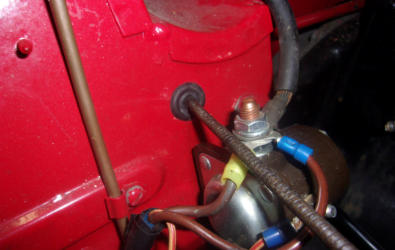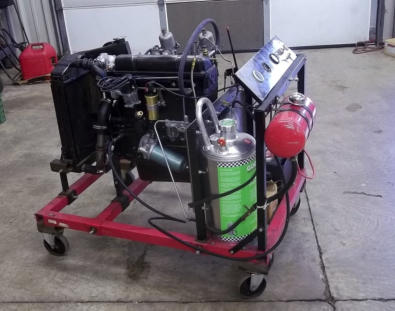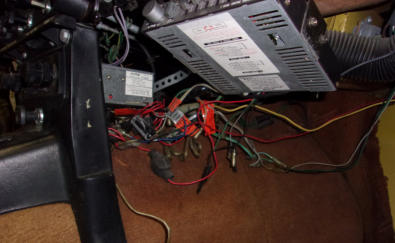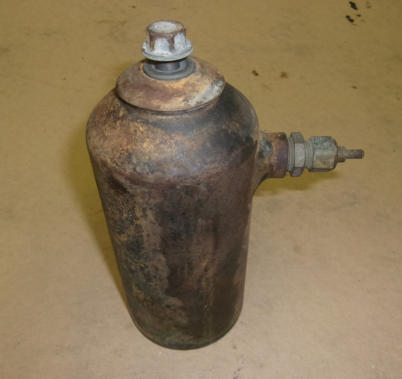

Macy’s Garage

© 2026 - Macy’s Garage, Ltd.

Blog
WHAT we’re doing, and HOW we’re doing it!
June 24, 2019
When performing a complete frame-up restoration, you really shouldn’t leave any stone unturned, unless you want to continually have to wrench on the car after the restoration is “done”. Take these TR6 carburetors for example. This car was actually driven here from about 100 miles away, and the owner described the performance as “very good”. From that comment, some might assume that it would be OK to leave all of the engine and drivetrain components as- is, because after all it “ran when disassembled”. But the owner wanted to drive the car and forget about ongoing repairs when we’re finished, so everything we touched would need to be examined and repaired. There’s no way to tell when the fuel system was last cleaned or the carburetors rebuilt, so we rebuilt them now just to be sure. It’s probably a good thing that we did. While not the dirtiest carbs we’ve ever seen, there was enough crud inside to warrant attention now, and defer the additional maintenance for many many years into the future.June 17, 2019
There have been many things done to our old Triumphs over the past 50-60 years, and we all get a good chuckle whenever we discover one of them. For this latest installment of “Why would they do that?”, we have a 4 cylinder oil filter canister that has been “improved” or “upgraded”, to use words which commonly describe today’s “gotta have” modifications. Someone had gone to great effort to add an electric switch to the side of the oil filter canister, presumably to add a warning or “idiot” light to the dash so as to quickly alert the driver when the oil pressure is lost. Did this happen often enough to someone’s TR to warrant all of the effort needed to make this addition? So why would someone do this? There’s a perfectly good gauge on the instrument panel to monitor the oil pressure, but perhaps the gauge had stopped working or the driver was just too lazy to check it occasionally. If you really need this attention getter, there are probably better and easier places to put it. If I found this extra idiot light necessary, I think I would have drilled and tapped one of the large oil gallery plugs along the left side of the block. Just be sure to put it in one of the gallery plugs, and not in one of the cam bearing retention screws!June 10, 2019
Despite stating at several places on our website, and in mentioning in our print ads that we do BOTH Repairs AND Restorations, I still find folks who have the mistaken impression that we only do full restorations. So for those who still can’t figure it out, YES - We work on Triumph TR’s that don’t need a complete restoration! Here’s a good example. This TR6 is here for an engine rebuild and a new wiring harness. In this photo, you can see the engine being lowered back into the car and it will be going home to it’s owner in northern Michigan very soon! The dark navy paint color on this TR6 is starting to grow on me. It was first introduced on the late TR4A, and carried through the TR250 and early TR6’s. You typically don’t see too many of these, but we’ve had a large number of them here recently, including a TR4 and a TR250 that were both painted here, and another TR250 that we’re restoring now that will get painted in this color. Next time you see one in person, you’ll understand why I’m wavering on my next personal project, a TR250 that is supposed to be Jasmine Yellow. I’m not so sure any more!May 28, 2019
When the upper wishbone bushings on your TR look like this, perhaps a front suspension rebuild is warranted. Some, in fact, would say that it’s long overdue! It’s one of those simple things that is often overlooked, but as you can see here, neglect can rear it’s ugly head from time to time. Just because there isn’t a grease nipple attached, or a fluid to drain and change occasionally, doesn’t mean that these types of items are necessarily “maintenance free”! Most folks who bring their TR’s here for “minor” service, say brakes or engine tuning, always leave with a suggestion that we “look the car over” while it’s here, and this is the type of neglect that we always seem to find. “Out of sight - out of mind” doesn’t mean that all is well in TR land! So the next time you are doing your annual maintenance, take a look around at some of the more “boring” moving parts. Your TR will thank you for it.May 20, 2019
This gorgeous TR4 went home to Florida today, with a planned stop at the TRA National Meet in Dillard, GA along the way. This car was originally scheduled to come here for evaluation of a bent frame, which later evolved into our replacing the rusty floor pans and other metalwork before shipping it home to the owner for completion. The frame was not repairable, but we had a good used frame in our warehouse to handle the original problem, and when the owner saw the photos and the quality of the metal repairs we were doing, he decided to ship the rest of his loose parts here for us to complete the full restoration! The results were this striking Dark Navy beauty (TR4A-TR6 color), with a brown interior that has been catching the attention of all visitors to our shop for the past several months. As with all of our full restorations, the results have far exceeded his expectations, and we were also able to complete the restoration and get it back home to be driven and enjoyed a good year or two (perhaps more) ahead of the time frame needed to go it alone at home in his own garage. Happy Triumph Motoring, Brooks!May 13, 2019
Every time we find wiring that resembles a rat’s nest, I can’t help but remind myself that old Joe Lucas wasn’t really such a bad guy after all! Lucas systems receive all of the blame when electrical components don’t work on British cars, but the trouble can usually be traced to some previous owner or mechanic’s handy work that looks something like this. Once someone goes in and starts cutting and splicing wires together to install a radio or repair some unrelated electrical item, all bets are off on the wiring ever performing again as it was originally designed! The internet is full of wise souls who’ll warn that you’d better “upgrade” your wiring harness and add all sorts of switches and relays to make it safe and reliable. But the truth of the matter is that unless you are adding heated seats or a mega watt stereo system with huge power requirements, a Triumph/Lucas electrical system will perform just fine, that is until the owner approaches the car with a pair of diagonal cutters and a roll of electrical tape!May 6, 2019
We covered rusty frames several weeks ago, and then this one appeared in our shop. This TR4 has a rusty area in a place where we’ve never seen it before. TR4 frames were actually TR3 frames, with a boxed section welded onto the outside of the front frame rails, allowing the lower wishbone mounts to be attached further out from the center, providing for the wider track offered by the TR4. (There were a few other frame modifications as well, but we won’t go into that here). This rust is at the rear tip of the added section, and if you look closely you can see the triangle shape along the top edge which denotes this additional piece. Now it does make sense that dirt and debris, along with road salt and moisture will collect here, but this is the first time we’ve discovered such rust damage in this spot. What’s really interesting is that we found this damage after wiping away the peeled paint from a brake fluid leak, and the big chunk of bondo that had been used to “repair” the rust fell off and hit the floor! Although probably not a structural issue, I think we would have preferred to repair it correctly, or leave it open so that in the future any moisture inside could drain out easily.April 30, 2019
When starting a freshly rebuilt engine for the first time, it is critical that all of the internal components be properly lubricated before the fire is lit. While we do lube everything up with assembly lube during the build process, it isn’t enough to protect all of the moving parts for the first few moments before the engine is capable of oiling itself. In my youth, when I was building smallblock Chevy engine for all my pals, I had an old distributor that could be used to run the oil pump without turning the crankshaft, and I could make the oil flow internally before hitting the key. Some folks will leave the spark plugs out and run the starter until some pressure shows on the gauge, but this isn’t good for the starter or the internals, especially the pistons and rings which rely on a fine spray of oil from the crankshaft and bearings. Now that we have this nice test stand to run every engine that we rebuild, we’ve also been using a higher tech solution to pre-oiling for several years now. If you’ll take note of the shiny aluminum can at the back of the stand, this is our Goodson pre-oiling system. All of the oil for the engine, along with the Comp Cams break-in suppliment, is added to this canister first, and then the whole works is pressurized before being pumped in through one of the oil gallery plugs. Oil flows completely through the engine under pressure before anything is allowed to rotate, and then on down to fill the oil pan and make ready for the oil pump to take over the oiling chores just as soon as the engine fires off for the first time. We never add new oil for a new engine through the breather cap in the valve cover. That’s just too “low tech” for us!April 22, 2019
Over the years, many folks have worked on these cars who have little to offer in the common sense department. Take for example the person who installed this Ford style starter relay on this TR4, and left the bare steel choke cable running within a quarter of an inch above the hot battery terminal, and without a stitch of insulation to keep the two from making contact! With the proper Lucas style relay, the hot battery terminal is moved farther away, making accidental contact unlikely. Thankfully the two never did touch and burn the car to the ground, but the choke cable moved around enough when pulled that it scared the crap out of most of the guys here. A few more years and a little more deterioration of the choke cable grommet, and we might have had one less TR4 in the world! And can you imagine if the carburetors were being removed so the cable was free to move around? There would have certainly been a big fire when the sparks met up with the gasoline which always spills when carbs are pulled! The competent team here at Macy’s Garage always looks beyond the “just make it work” mentality that often prevailed when these cars were serviced during the past several decades, and we always keep our eyes focused well beyond that bare bones functionality viewpoint. April 15, 2019 Those of you who are members of the Triumph Register of America (TRA) will no doubt enjoy the “tech” article regarding the disassembly of rear axle hubs in the most recent club newsletter. (Those of who own 4 cylinder TR’s and don’t belong to TRA, you really should!) The theme of the article is that these hubs are very difficult to remove from the axles to replace bearings and hub seals, an almost impossible task with huge hydraulic presses at commercial establishments. But we’ve also seen many hubs that were bent by a heavy press, and that’s why we have a proper puller and do all of the removal and reassembly here in our own shop. Quite a few TR owners have discovered that it is easier to stick their axles in a box and ship them off to Macy’s Garage to have the bearings and seals replaced correctly, than to run around their local town and find someone with a 100 ton + press, and then give them the opportunity to ruin their hubs. The UPS driver usually brings us a set of these at least once a month, and just like the axles in the photo here, we’ll have them on the way back in a day or two.April 8, 2019
There once was a time when TR owners couldn’t find parts or competent folks to repair their cars, so they were parked with the idea that “some day” they would be able to drive their precious Triumph again. The parts situation has improved over the past couple of decades, but the mechanic problem has only gotten worse for those of you who still insist on finding a local “wrench” to service your car. Those in the know will ship their cars and components to us to be properly repaired by people who work on nothing else, and as a result of this we get to see plenty of the failures that disabled so many TR’s in the past. What you see in this photo is a rear thrust washer from a TR4 gearbox, and the remains of the rear bearing inside of the 1st/reverse countershaft gear. Not only did this failure ruin the bearing, thrust washer, and the countershaft itself, but it spun the thrust washer which destroyed the gearbox case. This is a common failure with the 4-synchro gearboxes, and fortunately for the owner of this mess we did have a spare case in stock to get it back together quickly. We keep a huge inventory on hand for situations like this, but all of our used parts are reserved for use in our shop, and we almost never sell a used part outside of our own projects.April 1, 2019
It’s always a special day here when we are able to marry a freshly painted body tub onto a completely restored chassis. We always have our restorations together and apart multiple times throughout the process, but the final time is always a treat. From here forward, every part which goes onto the car will be there to stay, and it’s great fun to watch a fully restored TR appear before our eyes. The term most often used is a “Frame-Up” restoration, so most home restorers (and many “professional” shops) start by restoring the frame and suspension, and save the bodywork and paint until last. But the paint and bodywork phase creates a huge amount of dust and dirt, making a great big mess on top of any freshly restored chassis. For this reason, we wait to restore the frame and suspension until the body is ready to roll into the paint booth. The body tub gets painted on a dolly, while the chassis moves to another area of our shop to be restored. We’ll completely finish the chassis, put the engine and gearbox in place, with the exhaust and all of the brake lines run before the body is set in place for the final time.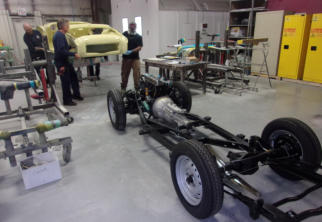

BLOG
2019-Q2
America’s BEST Triumph Shop
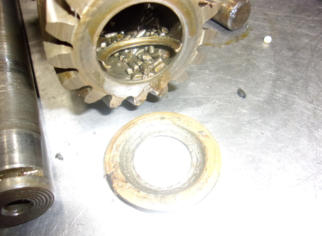


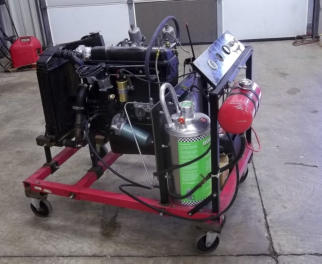


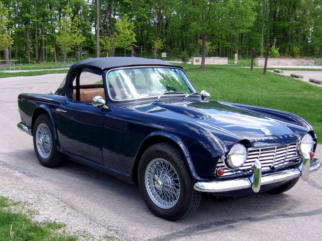







Macy’s Garage

© 2026 - Macy’s Garage, Ltd.

Blog
WHAT we’re doing, and HOW we’re doing it!
June 24, 2019
When performing a complete frame-up restoration, you really shouldn’t leave any stone unturned, unless you want to continually have to wrench on the car after the restoration is “done”. Take these TR6 carburetors for example. This car was actually driven here from about 100 miles away, and the owner described the performance as “very good”. From that comment, some might assume that it would be OK to leave all of the engine and drivetrain components as- is, because after all it “ran when disassembled”. But the owner wanted to drive the car and forget about ongoing repairs when we’re finished, so everything we touched would need to be examined and repaired. There’s no way to tell when the fuel system was last cleaned or the carburetors rebuilt, so we rebuilt them now just to be sure. It’s probably a good thing that we did. While not the dirtiest carbs we’ve ever seen, there was enough crud inside to warrant attention now, and defer the additional maintenance for many many years into the future.June 17, 2019
There have been many things done to our old Triumphs over the past 50-60 years, and we all get a good chuckle whenever we discover one of them. For this latest installment of “Why would they do that?”, we have a 4 cylinder oil filter canister that has been “improved” or “upgraded”, to use words which commonly describe today’s “gotta have” modifications. Someone had gone to great effort to add an electric switch to the side of the oil filter canister, presumably to add a warning or “idiot” light to the dash so as to quickly alert the driver when the oil pressure is lost. Did this happen often enough to someone’s TR to warrant all of the effort needed to make this addition? So why would someone do this? There’s a perfectly good gauge on the instrument panel to monitor the oil pressure, but perhaps the gauge had stopped working or the driver was just too lazy to check it occasionally. If you really need this attention getter, there are probably better and easier places to put it. If I found this extra idiot light necessary, I think I would have drilled and tapped one of the large oil gallery plugs along the left side of the block. Just be sure to put it in one of the gallery plugs, and not in one of the cam bearing retention screws!June 10, 2019
Despite stating at several places on our website, and in mentioning in our print ads that we do BOTH Repairs AND Restorations, I still find folks who have the mistaken impression that we only do full restorations. So for those who still can’t figure it out, YES - We work on Triumph TR’s that don’t need a complete restoration! Here’s a good example. This TR6 is here for an engine rebuild and a new wiring harness. In this photo, you can see the engine being lowered back into the car and it will be going home to it’s owner in northern Michigan very soon! The dark navy paint color on this TR6 is starting to grow on me. It was first introduced on the late TR4A, and carried through the TR250 and early TR6’s. You typically don’t see too many of these, but we’ve had a large number of them here recently, including a TR4 and a TR250 that were both painted here, and another TR250 that we’re restoring now that will get painted in this color. Next time you see one in person, you’ll understand why I’m wavering on my next personal project, a TR250 that is supposed to be Jasmine Yellow. I’m not so sure any more!May 28, 2019
When the upper wishbone bushings on your TR look like this, perhaps a front suspension rebuild is warranted. Some, in fact, would say that it’s long overdue! It’s one of those simple things that is often overlooked, but as you can see here, neglect can rear it’s ugly head from time to time. Just because there isn’t a grease nipple attached, or a fluid to drain and change occasionally, doesn’t mean that these types of items are necessarily “maintenance free”! Most folks who bring their TR’s here for “minor” service, say brakes or engine tuning, always leave with a suggestion that we “look the car over” while it’s here, and this is the type of problem we always seem to find. Out of sight - out of mind doesn’t mean that all is well in TR land! So the next time you are doing your annual maintenance, take a look around at some of the more “boring” moving parts. Your TR will thank you for it.May 20, 2019
This gorgeous TR4 went home to Florida today, with a planned stop at the TRA National Meet in Dillard, GA along the way. This car was originally scheduled to come here for evaluation of a bent frame, which later evolved into our replacing the rusty floor pans and other metalwork before shipping it home to the owner for completion. The frame was not repairable, but we had a good used frame in our warehouse to handle the original problem, and when the owner saw the photos and the quality of the metal repairs we were doing, he decided to ship the rest of his loose parts here for us to complete the full restoration! The results were this striking Dark Navy beauty (TR4A-TR6 color), with a brown interior that has been catching the attention of all visitors to our shop for the past several months. As with all of our full restorations, the results have far exceeded his expectations, and we were also able to complete the restoration and get it back home to be driven and enjoyed a good year or two (perhaps more) ahead of the time frame needed to go it alone at home in his own garage. Happy Triumph Motoring, Brooks!May 13, 2019
Every time we find wiring that resembles a rat’s nest, I can’t help but remind myself that old Joe Lucas wasn’t really such a bad guy after all! Lucas systems receive all of the blame when electrical components don’t work on British cars, but the trouble can usually be traced to some previous owner or mechanic’s handy work that looks something like this. Once someone goes in and starts cutting and splicing wires together to install a radio or repair some unrelated electrical item, all bets are off on the wiring ever performing again as it was originally designed! The internet is full of wise souls who’ll warn that you’d better “upgrade” your wiring harness and add all sorts of switches and relays to make it safe and reliable. But the truth of the matter is that unless you are adding heated seats or a mega watt stereo system with huge power requirements, a Triumph/Lucas electrical system will perform just fine, that is until the owner approaches the car with a pair of diagonal cutters and a roll of electrical tape!May 6, 2019
We covered rusty frames several weeks ago, and then this one appeared in our shop. This TR4 has a rusty area in a place where we’ve never seen it before. TR4 frames were actually TR3 frames, with a boxed section welded onto the outside of the front frame rails, allowing the lower wishbone mounts to be attached further out from the center, providing for the wider track offered by the TR4. (There were a few other frame modifications as well, but we won’t go into that here). This rust is at the rear tip of the added section, and if you look closely you can see the triangle shape along the top edge which denotes this additional piece. Now it does make sense that dirt and debris, along with road salt and moisture will collect here, but this is the first time we’ve discovered such rust damage in this spot. What’s really interesting is that we found this damage after wiping away the peeled paint from a brake fluid leak, and the big chunk of bondo that had been used to “repair” the rust fell off and hit the floor! Although probably not a structural issue, I think we would have preferred to repair it correctly, or leave it open so that in the future any moisture inside could drain out easily.April 30, 2019
When starting a freshly rebuilt engine for the first time, it is critical that all of the internal components be properly lubricated before the fire is lit. While we do lube everything up with assembly lube during the build process, it isn’t enough to protect all of the moving parts for the first few moments before the engine is capable of oiling itself. In my youth, when I was building smallblock Chevy engine for all my pals, I had an old distributor that could be used to run the oil pump without turning the crankshaft, and I could make the oil flow internally before hitting the key. Some folks will leave the spark plugs out and run the starter until some pressure shows on the gauge, but this isn’t good for the starter or the internals, especially the pistons and rings which rely on a fine spray of oil from the crankshaft and bearings. Now that we have this nice test stand to run every engine that we rebuild, we’ve also been using a higher tech solution to pre-oiling for several years now. If you’ll take note of the shiny aluminum can at the back of the stand, this is our Goodson pre-oiling system. All of the oil for the engine, along with the Comp Cams break-in suppliment, is added to this canister first, and then the whole works is pressurized before being pumped in through one of the oil gallery plugs. Oil flows completely through the engine under pressure before anything is allowed to rotate, and then on down to fill the oil pan and make ready for the oil pump to take over the oiling chores just as soon as the engine fires off for the first time. We never add new oil for a new engine through the breather cap in the valve cover. That’s just too “low tech” for us!April 22, 2019
Over the years, many folks have worked on these cars who have little to offer in the common sense department. Take for example the person who installed this Ford style starter relay on this TR4, and left the bare steel choke cable running within a quarter of an inch above the hot battery terminal, and without a stitch of insulation to keep the two from making contact! With the proper Lucas style relay, the hot battery terminal is moved farther away, making accidental contact unlikely. Thankfully the two never did touch and burn the car to the ground, but the choke cable moved around enough when pulled that it scared the crap out of most of the guys here. A few more years and a little more deterioration of the choke cable grommet, and we might have had one less TR4 in the world! And can you imagine if the carburetors were being removed so the cable was free to move around? There would have certainly been a big fire when the sparks met up with the gasoline which always spills when carbs are pulled! The competent team here at Macy’s Garage always looks beyond the “just make it work” mentality that often prevailed when these cars were serviced during the past several decades, and we always keep our eyes focused well beyond that bare bones functionality viewpoint.April 15, 2019
Those of you who are members of the Triumph Register of America (TRA) will no doubt enjoy the “tech” article regarding the disassembly of rear axle hubs in the most recent club newsletter. (Those of who own 4 cylinder TR’s and don’t belong to TRA, you really should!) The theme of the article is that these hubs are very difficult to remove from the axles to replace bearings and hub seals, an almost impossible task with huge hydraulic presses at commercial establishments. But we’ve also seen many hubs that were bent by a heavy press, and that’s why we have a proper puller and do all of the removal and reassembly here in our own shop. Quite a few TR owners have discovered that it is easier to stick their axles in a box and ship them off to Macy’s Garage to have the bearings and seals replaced correctly, than to run around their local town and find someone with a 100 ton + press, and then give them the opportunity to ruin their hubs. The UPS driver usually brings us a set of these at least once a month, and just like the axles in the photo here, we’ll have them on the way back in a day or two.April 8, 2019
There once was a time when TR owners couldn’t find parts or competent folks to repair their cars, so they were parked with the idea that “some day” they would be able to drive their precious Triumph again. The parts situation has improved over the past couple of decades, but the mechanic problem has only gotten worse for those of you who still insist on finding a local “wrench” to service your car. Those in the know will ship their cars and components to us to be properly repaired by people who work on nothing else, and as a result of this we get to see plenty of the failures that disabled so many TR’s in the past. What you see in this photo is a rear thrust washer from a TR4 gearbox, and the remains of the rear bearing inside of the 1st/reverse countershaft gear. Not only did this failure ruin the bearing, thrust washer, and the countershaft itself, but it spun the thrust washer which destroyed the gearbox case. This is a common failure with the 4-synchro gearboxes, and fortunately for the owner of this mess we did have a spare case in stock to get it back together quickly. We keep a huge inventory on hand for situations like this, but all of our used parts are reserved for use in our shop, and we almost never sell a used part outside of our own projects.April 1, 2019
It’s always a special day here when we are able to marry a freshly painted body tub onto a completely restored chassis. We always have our restorations together and apart multiple times throughout the process, but the final time is always a treat. From here forward, every part which goes onto the car will be there to stay, and it’s great fun to watch a fully restored TR appear before our eyes. The term most often used is a “Frame-Up” restoration, so most home restorers (and many “professional” shops) start by restoring the frame and suspension, and save the bodywork and paint until last. But the paint and bodywork phase creates a huge amount of dust and dirt, making a great big mess on top of any freshly restored chassis. For this reason, we wait to restore the frame and suspension until the body is ready to roll into the paint booth. The body tub gets painted on a dolly, while the chassis moves to another area of our shop to be restored. We’ll completely finish the chassis, put the engine and gearbox in place, with the exhaust and all of the brake lines run before the body is set in place for the final time.


America’s BEST Triumph Shop




